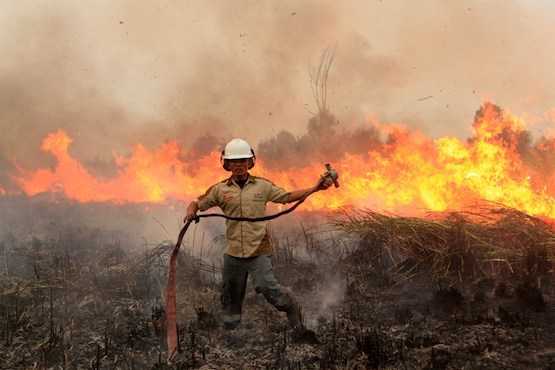
An Indonesian fire fighter combats a fire at Ogan Kemering Ilir, in South Sumatra in this file photo. Smog from forest fires in Indonesia during that year prompted the cancellation of flights and warnings for people to stay indoors, while pushing air quality to unhealthy levels in neighboring Singapore and Malaysia. (Photo by Abdul Qodir/AFP)
During the drier months of the last two decades, parts of Southeast Asia have regularly become shrouded in a grey haze.
In response, people in affected areas have walked around with masks while medics noted a rise in respiratory ailments.
Malaysia, Indonesia and Singapore are the hardest hit by the haze, which is the result of fires lit for land clearing. The haze frequently reaches unhealthy levels and is usually followed by public announcements to remain indoors. Schools close and flights get delayed.
This annual nightmare could end this year. Two years after the ASEAN agreement on trans-boundary haze pollution was ratified by Indonesia, the last of the 10-member states to do so, results in the battle to end the haze are overdue.
The agreement is legally binding. ASEAN members — Brunei, Cambodia, Laos, Malaysia, Myanmar, Philippines, Singapore, Thailand and Vietnam — along with Indonesia have an opportunity to show that development need not come only at the cost of their peoples’ health.
Tabled in 1997, the agreement aims to prevent and monitor trans-boundary haze pollution as a result of land and forest clearing using fires. It requires members to join in putting in place measures to prevent the haze and the fires that cause it.
It will be a tricky task as commercial and political motives also sustain these destructive practices. As an example, conglomerates clear forests for products like vegetable oils or paper. Many of them have gained forest concessions are suspected of contributing to the haze but they are however immune from prosecution because of political backing.
Satellite images show that 70 percent of hotspots in Sumatra and in Kalimantan on Borneo Island are in plantations areas. According to reports some 1.7 million hectares of land, more than a third of which are on peatland in Sumatra and Kalimantan, have been burned.
Meanwhile the weather in the region has been changing. Scientists in Malaysia studying renewable energy sources noted back in 1999 how their data on sunlight was constantly changing year on year.
A paper submitted at the World Renewable Energy Congress '99 in Kuala Lumpur concluded that extensive land clearing caused these changes. Data gathered revealed that there was less and less direct sunlight reaching recording stations.
Global warming is now well-documented and accepted as fact. Studies indicate that the average global surface temperature has increased by approximately 0.3-0.6 C over the last century and is forecast to increase by 1.4-5.8 degrees Celsius by the end of this century.
Looking at the past, the difference between global temperatures during an ice age and an ice-free period was also only about 5 degrees Celsius, showing how small temperature variations can trigger significant climatic change.
Apart from hotter days, many scientists believe more turbulent weather patterns are expected to be a part of the future. Intense and frequent tropical storms are likewise possible results of these self-induced changes.
Global warming may also affect wildlife with species unable to survive such temperatures possibly becoming extinct. Human health is also at stake with the further spread of diseases such as malaria due to flooding, a greater risk of heat stroke for individuals, and poor air quality.
Climate change is very likely having an impact now on our planet and its life, according to the latest installment of a report published by the Intergovernmental Panel on Climate Change (IPCC).
Future problems caused by more frequent droughts, rising sea levels and growing deserts all point to developing nations suffering more than rich countries, IPCC says. The report is the second chapter of the IPCC's Fourth Assessment into the causes and effects of climate change.
Back in the villages around Borneo and Sumatra farmers are preparing for the harvest after which they will burn off the remaining stalks to clear them and ready their fields for planting.
It is this slash-and-burn farming that is largely to blame for the haze. It is the cheapest way to clear brush and secondary forests as many villagers lack the resources to practice modern agricultural methods such as using mechanized methods to cultivate their land.
While slash-and-burn farming has always been part of the agricultural methods of poor farmers in the region, the practice became widespread as populations swelled and demand for land increased.
While there are laws prohibiting the burning and clearing of forests these are rarely enforced chiefly because of fears that it would alienate the rural electorate who largely support their governments.
Last year around this time, schools in Malaysia were being closed and people urged to stay indoors as the haze cast a pall over several parts of the country. So it is hard to see any change. As the dry season looms, all eyes will be on how the region’s anti-haze cooperation will hold up. It will show if ASEAN has the determination and courage to confront and fix problems in its backyard. Failure will cement the idea that its agreements are just smoke and mirrors.


